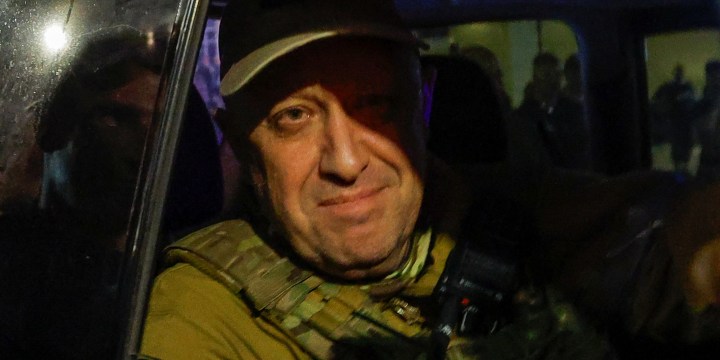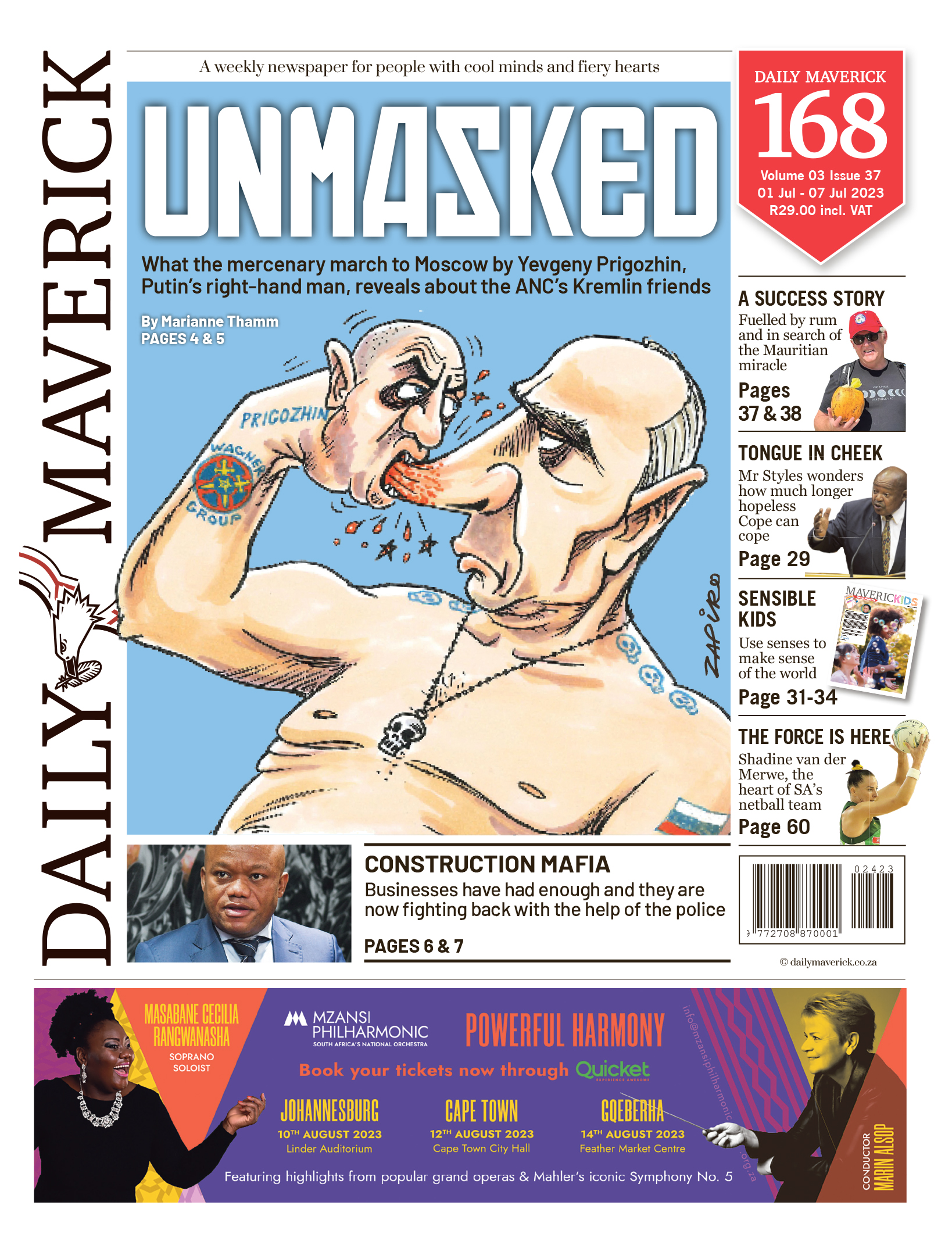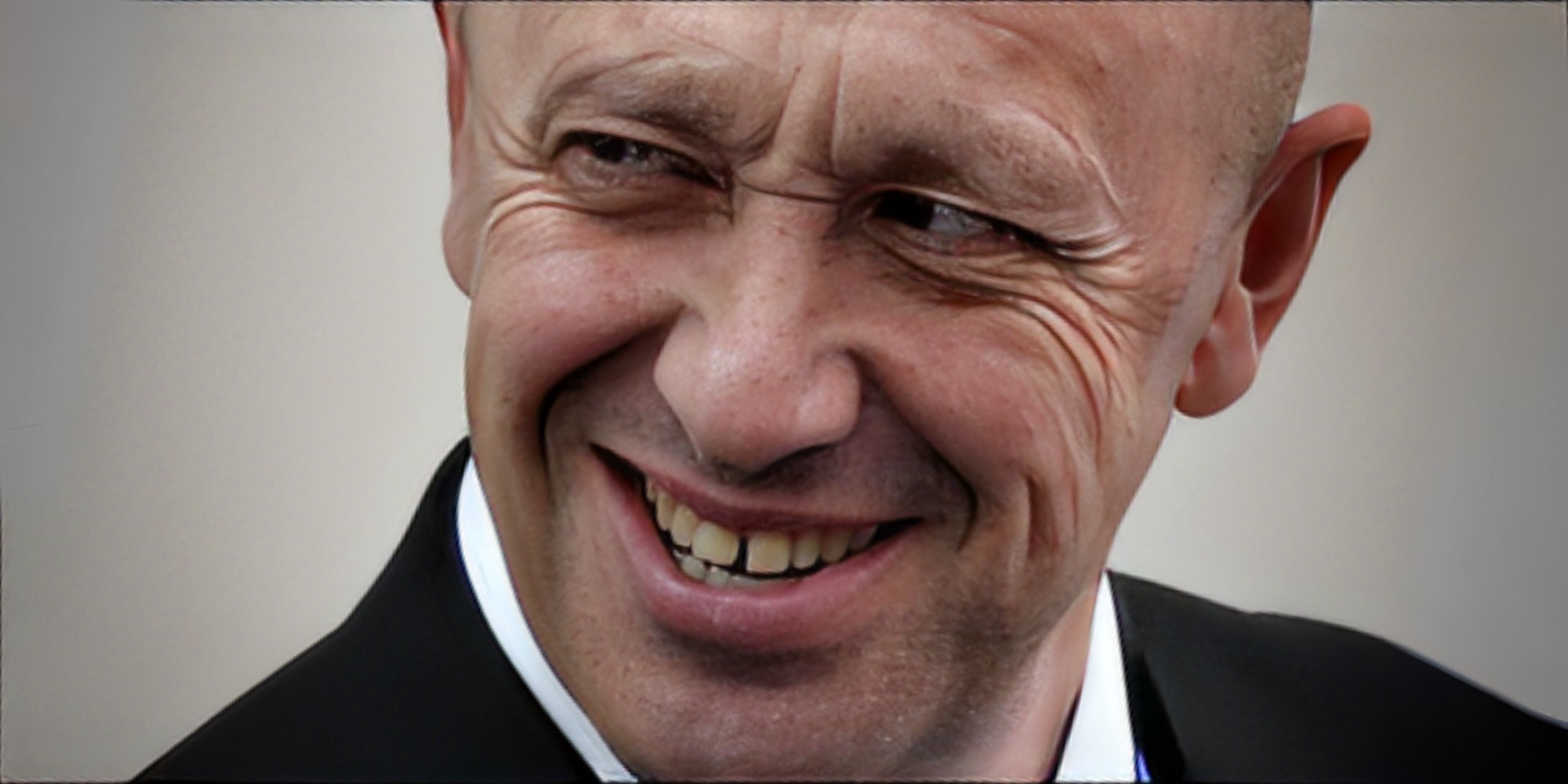RUSSIA CRISIS ANALYSIS
President Putin unmasked – pulling back the curtain on Yevgeny Prigozhin’s mercenary mutiny

The events of 24 June have lifted the lid on Russia’s ‘deep state’ operations, which are so pervasive that the man responsible for the military uprising is essentially still too useful to be punished.
No one has dared to challenge or provoke Russian President Vladimir Putin in the manner in which Yevgeny Prigozhin, the head of the Wagner Group, has done by threatening to let his soldiers loose on Moscow.
What Prigozhin did in that moment was make history, lifting the lid on Russia’s “deep state”, which moves in the shadows of what passes in public for a “democratic” dispensation. The hybrid political system – the state contracting services out to malevolent private interests, be they “political technologists” or armies for hire – has been unmasked.
Prigozhin’s role as Wagner CEO was “to oversee the activities that the state cannot carry out in the open and thus has to outsource”, wrote French journalist Régis Genté in a May 2023 paper for Eastern Circles, a geoeconomics think-tank.
Until the mutiny, Putin had never openly or publicly admitted to his paternity of Prigozhin’s power and wealth, or that the Wagner leader was linked to the Russian state in any way.
In an attempt to claim victory after Wagner’s retreat after the 24-hour rebellion, Putin revealed for the first time that the state had paid Prigozhin’s military $1-billion from May 2022, when it joined the Kremlin’s invasion of Ukraine, until May 2023.
Out the window went the small matter of plausible deniability, held for so long by the Putin administration, which has used it to hide behind when crimes against humanity are being committed in foreign lands. The Ukrainian battlefield victories, in Putin’s mind, are his and the Russian military’s.
Bigger threats
Back in 2015, Putin reminded American filmmaker Oliver Stone in a series of interviews that the Russian Federation was a democracy with four parties represented in Parliament. The country had long abandoned communism, he said, and favoured a market economy.
This, of course, has raged like a club-hoofed bull in a china shop through Russia, creating formidable organised crime networks and blessing oligarchs, and politically connected officials with wealth beyond imagination, spread across the globe.
Opposition in Russia is not tolerated and, around 2011, when Alexei Navalny emerged as a challenger, Prigozhin placed his various services on the Kremlin’s table.
Troll farms emerged and infected social media and internet platforms with parodies and fake news, all controlled by the Patriot Media Group, Prigozhin’s media holding company. The Internet Research Agency, too, was a creation of Prigozhin’s, deployed to disrupt the 2016 US election.
The Federal Bureau of Investigation has offered a $250,000 reward for his arrest on charges “of conspiracy to defraud the United States by impairing, obstructing and defeating the lawful functions of the Federal Election Commission, the Department of Justice and the Department of State”.
That’s Prigozhin’s US mission accomplished. Navalny, imprisoned in Russia while on trial on charges of “extremism”, sent a message this week from his cell, posted to Twitter by aides, wondering why he was a greater threat to Russia than “mercenaries who had launched an armed mutiny”.

Russian opposition activist and protest movement leader Alexei Navalny speaks during an anti-Putin opposition rally at Pushkin Square on 5 March 2012 in central Moscow, Russia. (Photo: Konstantin Zavrazhin / Getty Images)
Dark money
Much of the “dark money” churned out by Putin’s hybrid outsourced politics was – and is – washed by respectable banks only too eager to do business with no borders or controls. Cyprus, “Moscow on the Med” as it is known, is a preferred destination, as is the Cayman Islands.
A 2014 report into the “Russian Laundromat” by the Organized Crime and Corruption Reporting Project (OCCRP) revealed that, between 2011 and 2014, no fewer than 19 Russian banks had laundered $20.8-billion to 5,140 companies in 96 countries. What this industrial-sized laundromat proved, said the OCCRP, was that “the world’s banking system has been impotent, unable to stanch massive flows of illicit money”.
At the apex of this vast global network is Putin, who runs the show through a selection of enablers and carrots-and-sticks, and whose foreign policy is essentially based on the evil, encroaching West and Nato.
The Soviet-born British journalist Peter Pomerantsev, who has worked extensively in Russia, has described the mood of the country and the capital.
Putin’s Moscow, he wrote, “can feel like an oligarchy in the morning and a democracy in the afternoon, a monarchy for dinner and a totalitarian state by bedtime”.
In Africa, Russia has been at work to further its economic and political interests through Wagner in the Central African Republic (CAR), South Sudan and Mali since 2018. Bodies have piled up wherever the group goes.
Wagner is accused of murdering three Russian journalists – Kirill Radchenko, Alexander Rastorguyev and Orkhan Dzhemal – in 2018. They were investigating the role of private military contractors in the CAR, whose natural resources wealth – including diamonds, gold, oil and uranium – are all of interest to Prigozhin.
Democracy is a farce in Putin’s eyes, and Donald Trump’s 2016 victory is evidence of this. The Russian president said so himself after the election almost broke the system.
Europe, with its “liberal” values, is also a target of Putin’s disdain. Countries in the region seeking autonomy or to untether themselves from Russia have felt the Kremlin’s wrath. Ukraine has been feeling the rage since February 2022.

Businessman Yevgeny Prigozhin shows Russian Prime Minister Vladimir Putin his school-lunch factory outside St Petersburg on 20 September 2010. (Photo: Alexey Druzhinin / SPUTNIK / AFP)
Technically nonexistent
Rather than mercenaries, Wagner is “a contracting mechanism” for the Russian military and its intelligence agency, with Prigozhin as the broker.
Wagner is not registered as a single entity in Russia or anywhere else, rendering it technically nonexistent.
“Everyone who has signed on [with Wagner] is working for the Russian state,” said Kimberly Marten, professor of political science at Barnard College in New York and a member of Columbia University’s Harriman Institute – Russian, Eurasian, and East European Studies.
What occurred at the weekend was not an attempted coup by Prigozhin, added Marten.
“It was a misguided attempt to bring attention to his grievances,” she told Amy Goodman, veteran political reporter and executive producer of the Democracy Now! news programme.
Prigozhin has not been seen since rushing into the embrace of Belarusian strongman Alexander Lukashenko after turning back the Wagner troops from Rostov-on-Don and Moscow. But the old dog of war did circulate an audio clip claiming his rebellion was “not against Putin but the defence ministry”.

An interior view of the PMC Wagner Centre, which is a project implemented by the businessman and founder of the Wagner private military group Yevgeny Prigozhin, during the official opening of the office block in St Petersburg, Russia, 4 November 2022. (Photo: Reuters / Igor Russak)
Too big to kill
Journalist Pomerantsev, in Nothing Is True and Everything Is Possible: Adventures in Modern Russia, paints the Russian Federation as not in transition but as “some sort of postmodern dictatorship that uses the language and institutions of democratic capitalism for authoritarian ends”.
That Prigozhin survived this public showdown with Putin, using threats and expletives on social media, is an indication of his continued usefulness to the Kremlin.
Bill Browder, author of the bestseller Red Notice, said Prigozhin survived the challenge because he “is too big to kill”. Browder had campaigned for the Magnitsky Act, named after the auditor and tax adviser Sergei Magnitsky, who was tortured and murdered in Russian custody.
With the Russian military having been hollowed out by corruption, said Browder, it was Prigozhin who kept up the momentum of the war in Europe.
“Prigozhin saved Putin from total humiliation in Ukraine. And as time went on, it [Wagner] got bigger and bigger, and wanted to run the whole military. That is when the establishment began fighting with him.”
The way it works in Russia, according to Marten, is that protection from the top is phrased as “having a roof”.
“Prigozhin has been under Putin’s roof. What seems to be happening is that his head got too big for his roof. This theatrical march on the Russian city was so that he could get the ear of the leadership,” she said.
Wagner is an extremely agile force of about 25,000 men, many recruited from Russian prisons. It has access to pilots, highly trained snipers, and modern arms and equipment.
However, Prigozhin had “never been Putin’s friend. He has been his servant,” said Marten.
Prigozhin still maintained contact with the organised crime networks in St Petersburg, she added, which were there when he launched his post-prison string of catering businesses with gigantic government contracts, all facilitated by Putin.
What the rebellion had done, she said, was to make Putin look weak.
“People in his inner circle will be emboldened and this will not be a bloodless event. Thirteen Russian airmen were shot down by the Wagner forces as they flew overhead. They will not forget or forgive this.”
Besides, Prigozhin was not the only oligarch with an army at his disposal. Gazprom, Russia’s oil giant, announced in February this year that it was establishing a private military company. There are fears that this trend may continue and grow.
Uncertain future
Experts and pundits across the globe agree that Putin has emerged from the saga somewhat weakened but more dangerous, and very much in control.
Prigozhin maintains that his beef is with Defence Minister Sergei Shoigu and army chief Valery Gerasimov, and not Putin.
For now, Wagner soldiers have been instructed to join the Russian army formally. The group’s activities in Africa are likely to continue in one form or another, as it is looking after strategic geopolitical assets on behalf of Russia. It also finds the region sympathetic to the Kremlin.
Putin’s antipathy towards the West has seen him seek to strengthen ties with strongmen and illiberal regimes that share this particular pea under the political mattress. In Venezuela, Wagner has backed Nicolás Maduro, and it has also cast its gaze towards Mexico and Haiti.
Prigozhin might choose Africa over exile in Belarus. The situation at present remains opaque, as always, and anything can happen. DM
This story first appeared in our weekly Daily Maverick 168 newspaper, which is available countrywide for R29.





















I don’t believe this was a simple dog fight between prigozhin and putin’s military chiefs. The Wagner forces might have eventually arrived in Moscow but there should have been no shots fired. There should have been a political upheaval by a sizeable proportion of the Kremlin who would have arrested the military chiefs and possibly had a replacement for putin as well.
They chickened out leaving prighozin no option but to shoot down a number of military aircraft. putin reportedly fled Moscow and eventually came out of the woods to say a civil war had been averted.
putins dilemma is that he knows he was betrayed by a number of people close to him, but he doesn’t know which ones and when they will try again.
It’s the way the dogs of war work.